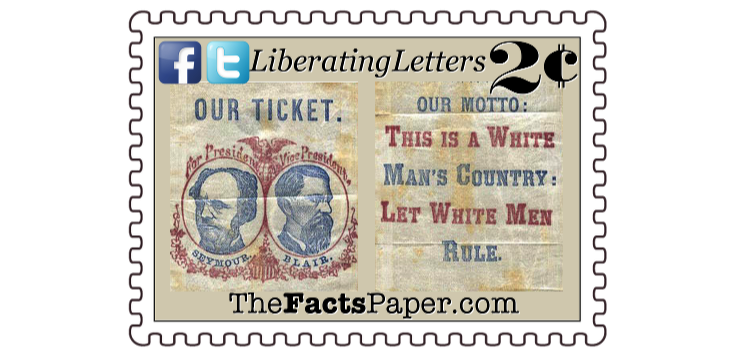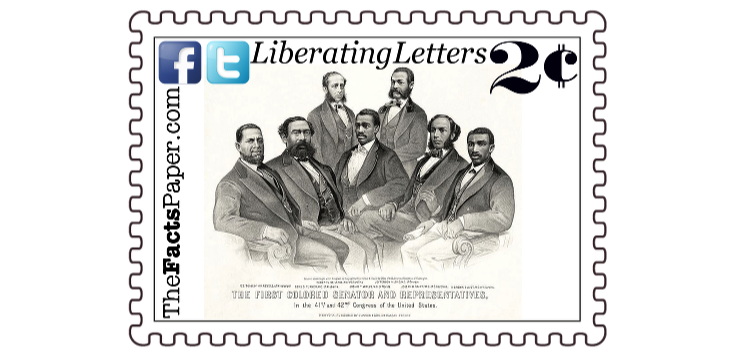Johnson implored Senate Minority Leaders Everett Dirksen (R-IL) to gather support from Republicans to pass the bill. As the bill mirrored Sumner’s 1875 Civil Rights Act that the Supreme Court ruled unconstitutional in 1883, several conservative Republicans recognized the same Constitutional issues the SCOTUS observed. Regardless, Dirksen garnered the needed votes to end the Democrat filibuster and bring the bill to a full vote. Despite needing Civil Rights Acts specifically to counter Democrat and KKK oppression of blacks in the South, once Johnson signed the bill, Democrats began their campaign to claim ownership of the Civil Rights Movement.
Liberty, the history of the Democratic Party shows that their only concern for black Americans was regarding getting their vote. If they couldn’t intimidate blacks from voting, then they would claim those votes through manipulation. Once Johnson instituted the multiple entitlement programs under the “Great Society,” Democrats have convinced minorities they can’t survive without them. Much like slave owners contended. As we speak, Democrats are implementing similar tactics to ensure the Hispanic vote. However, as they continue to refuse to accept President Donald Trump’s offer which includes even more than the Democrats wanted for Dreamers (children brought here illegally), Senator Chuck Schumer (D-NY) and Representative Nancy Pelosi (D-CA) continue to bulk as the issue itself is more beneficial to their campaign chauffeurs than actually solving the problem. As with the Civil Rights legislation, they never really wanted a solution. They want the issue. They want the power. (see The Right's Fight For Rights)
These facts are not taught in schools today as liberal progressive policies continue to dominate the education system. Educators choose to lie and deceive America’s children. Liberty, you must continue to seek, learn, share and fight for the truth, as Satan longs to enslave and destroy humanity with such distortions and falsehoods.
That’s my 2 cents.
Love,
Mom
Once Rebel Democrats regained their voting rights, anti-black voting laws again oppressed the black population in southern states. Furthermore, they began efforts to eliminate the hundreds of blacks elected to various offices, effectively paralyzing the Republican footprint that had appeared during Reconstruction. (see The Forgotten Senator, From House Slave To House Of Representatives and The Forgotten Representative) Southern states enacted Black Codes, Jim Crow Laws, poll taxes and other laws limiting and restricting blacks’ rights while claiming a society of “separate but equal” facilities. (see Separate But Equal?, Free At Last?, The Birth Of A Nation, and Freedom Day)
Immediately following the passage of the 1875 Act, Democrats obtained control of the U.S. House of Representatives, thus ending the Reconstruction Era. No further Civil Rights legislation entered Congress until 1957 under Republican President Dwight D. Eisenhower.
When Democrats won both U. S. Houses of Congress, as well as the White House, in 1892, they immediately began repealing all Civil Rights legislation Republicans implemented, including the KKK Enforcement laws. They even attempted to repeal the 14th and 15th Amendments. The 1896 Supreme Court case of Plessy v. Ferguson established the constitutionality of the “separate but equal” concept until Brown v. Board of Education of Topeka overturned the ruling. (see Separate But Equal?)
After having to send federal troops to the South the escort black students into a newly integrated school, Eisenhower showed support for the ruling by introducing the Civil Rights Act of 1957. Designed to again establish voting rights for blacks, Senate Majority Leader Democrat Lyndon B. Johnson blocked the bill for months. However, he began working towards compromise, stating "These Negroes, they're getting pretty uppity these days and that's a problem for us since they've got something now they never had before, the political pull to back up their uppityness. Now we've got to do something about this, we've got to give them a little something, just enough to quiet them down, not enough to make a difference. For if we don't move at all, then their allies will line up against us and there'll be no way of stopping them, we'll lose the filibuster and there'll be no way of putting a brake on all sorts of wild legislation. It'll be Reconstruction all over again." (see Free At Last?)
Therefore, Johnson completely neutralized the bill by removing all pertinent content, rendering it virtually meaningless. Upon its passage, he bragged to black voters that Democrats gave them an important piece of legislation while comforting segregationist Democrats that he removed its heart and soul first. Disappointed that Johnson gutted his bill, Eisenhower was able to strengthen it with a second Civil Rights Act in 1960.
When the Civil Rights Act of 1964 arrived on the Senate floor on February 17th, Johnson again faced a predicament. However, this time he was president. Johnson realized the propaganda opportunity the Democrat controlled Congress held. Since Eisenhower increased the power of the black vote, Johnson needed to ensure those votes for his party. Yet, even though Democrats maintained a 2/3rds majority in the Senate, too many segregationists opposed the legislation and threatened to kill the bill.
As Senate debates convened on the Chamber Floor, the two prominent Civil Rights leaders of the time, Martin Luther King, Jr, and Malcolm X, came to listen on March 26th. Both were concerned about the legislation in Democrat hands as King was a Republican and Malcom X denounced the treatment of blacks by Democrats. (see Free At Last?) Outside the Capital, the two met for the first and only time, talking for only a minute.
February 17, 2018
Dear Liberty,
The tension was palpable in the Senate Chamber as discussion began for the highly contentious legislation. However, the divisions did not just cut down party lines, but through them as well. The 67 Democrat members could have easily passed the bill, with the 33 Republicans being irrelevant, yet all but one of the twenty-one Democrat members from southern states stood strong against it. Therefore, Republican support was paramount for its passage. For supporters of the bill, history proved Republicans would deliver.
Following the Civil War, the abolitionist Republican Party overwhelmingly controlled both houses of Congress. They focused on reconstructing the South to function without slavery, passing legislation guaranteeing rights to black citizens. However, once Democrat Andrew Johnson assumed the presidency as a result of Republican Abraham Lincoln’s assassination, he blocked Congress at every turn with political appointments and vetoes. (see Civility War Ends and Conspiracy Theories)
Starting in 1865, Republicans began passing laws and amendments supporting civil rights for ex-slaves as well as free Northern blacks. The 13th Amendment abolished slavery yet many states still prohibited voting rights to non-whites. As Southern states were readmitted back into the Union, they began enacting even stricter laws to prohibit blacks from utilizing their Constitutional rights. (see Separate But Equal?, Free At Last?, The Birth Of A Nation, and Freedom Day) As a result, Congress passed the first Civil Rights Act in 1865, which guaranteed equal protection under the law for all Americans. However, Johnson vetoed it, forcing Congress to pass it again in 1866. Following Johnson’s second veto, 2/3rds majorities in both chambers overrode his veto, becoming the first instance Congress exercised this right on a major bill. (see Views And Vetoes)
Despite the historic legislation, Congress knew a law could be easily changed and repealed. Therefore, they drafted the 14th and 15th Amendments ensuring black Americans citizenship and male suffrage respectively. (see America’s Voting Record) Advocates such as Frederick Douglass helped promote support and state ratification of these Amendments. (see Reading, Writing and Redemption) Democrats continued to publicize their hostility towards blacks, choosing the motto, “This is a White Man’s Country, Let White Men Rule,” as their 1868 campaign slogan. As a result, Republicans won the White House again with General Ulysses S. Grant. (see Civility War Ends)
CIVIL RIGHTS...
AND WRONGS

Recognizing the South’s efforts to defy the 15th Amendment with state legislation and the tyrannical acts of the Ku Klux Klan, considered the "Terrorist Arm of the Democratic Party" in Senate debates, Congress passed three Enforcement Acts or Ku Klux Klan Acts, in 1870 and 1871. They provided the president the legal authority to combat the KKK and other white supremacy groups persecuting blacks and Republicans. (see There’s Nothing Right About The Alt-Right) The third bill allowed the president to suspend writ of habeas corpus for members of the organizations. Thanks to these Acts, the KKK was virtually dead by the end of the century. (see The Forgotten Representative) However, progressive Democrat President Woodrow Wilson reestablished the organization with his support of the 1915 film The Birth Of A Nation, which included racist quotes from his own book, History of the American People. (see The Birth Of A Nation) It re-empowered the tyrannical group until the Civil Rights Movement of the 1960s. (see Free At Last? and Walking To Freedom)


With the help of African-American notable John Mercer Langston, creator and first dean of Howard University’s law school, Republican Party founder Senator Charles Sumner (R-MA) drafted the Civil Rights Act of 1875. (see The Birth Of A Movement) Wanting to further the protection of rights of blacks, the Act declared, "All persons...shall be entitled to the full and equal enjoyment of accommodations, advantages, facilities, and privileges of inns, public conveyances on land or water, theaters, and other places of public amusement.” The law passed yet was not actively enforced, especially as it drew constitutional challenges. In 1883, the Supreme Court heard arguments and ruled the bill unconstitutional. While the court agreed in an 8-1 ruling that the 14th Amendment allowed the federal government to prohibit discrimination in state and local governments, it did not grant them the authority to do so in private organizations and by individuals.
Rebels in the South were unable to immediately vote even as their states re-entered the Union. Since blacks understood it was the anti-slavery Republican Party and Abraham Lincoln who freed them and were fighting for their rights, they were almost exclusively Republican. Therefore, for the first few years of Reconstruction, Republicans dominated both Federal and State legislatures. Hundreds of blacks also held these and local seats as Republicans. However, the KKK forcefully terrorized Republicans, both black and white, intimidating them to vote Democrat or not vote at all.




